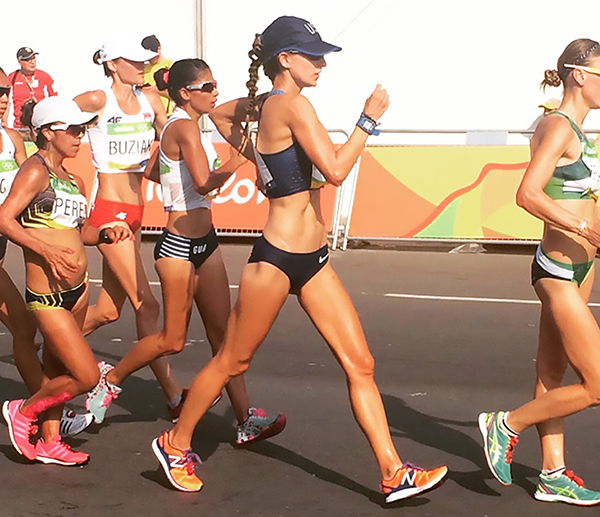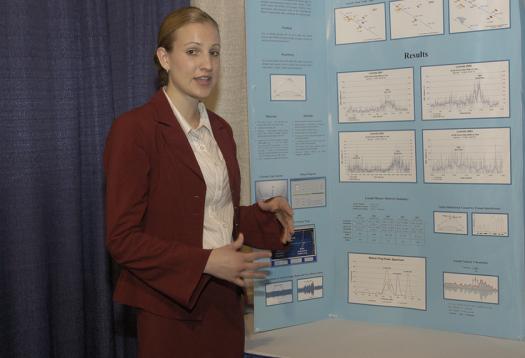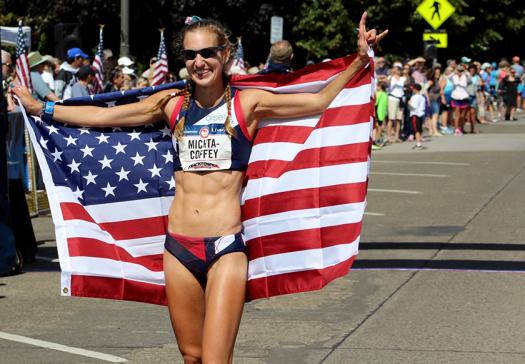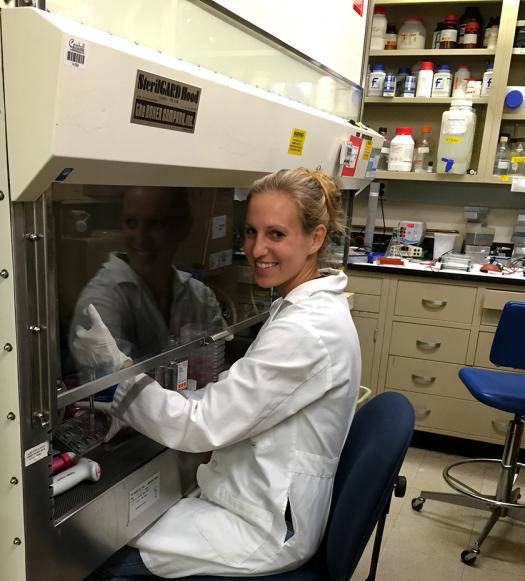Science keeps this Olympian’s mind sharp

Not only is Maria Michta an Olympian race walker, she also has a Ph.D. in biomedical sciences. She’s the ultimate combo of scientist and athlete.
Read on to learn more about Maria’s adventures at the Olympics and how science helped to keep her mind sharp, while race walking made her more efficient in the lab. The Science Talent Search and other science fairs, she said, cultivated her love of science.

THE IMPORTANCE OF SCIENTISTS HAVING OTHER INTERESTS: As long as I can remember, I was the kid that wanted to do it all — sports, music, classes, etc. But it wasn’t until after the 2012 Olympics when I had originally thought I would retire from race walking that I realized how much I needed both.
I realized how important a good old-fashioned sweat-dripping workout was to my mental sanity. It can really clear my mind, allow me to refocus, and provide a great outlet for stress. Having to fit in my workouts kept me disciplined and structured and definitely forced me to prioritize my daily activities. I got more done in lab when I had an important workout because my whole week had to be carefully planned out. Being busy forced me to be efficient and productive.
I realized how important a good old-fashioned sweat-dripping workout was to my mental sanity.
While my lab productivity definitely benefited because of my race walking, the reverse was true too. Being a full-time athlete may appear to be an enjoyable luxury, but often it can also be a burden in itself. Too often elite athletes become consumed with their training and mentally become burnt out. Constantly thinking about something, even in a positive manner can be beyond taxing mentally. Science helped keep my mind sharp while allowing me to explore a passion. It provided something else for my brain to be occupied with and distracted by. It also provided a great social outlet, as I genuinely love the people I worked with in lab. Being a student made me a better athlete and being an athlete made me a better student.
Being busy forced me to be efficient and productive.
HOW SHE FIRST BECAME INTERESTED IN STEM: As long as I can remember I have been curious about the world around me and am inquisitive by nature. This lent itself perfectly to the world of STEM. My father had studied insects and had many insect collections. So I too wanted to start my own collection. I wanted to understand how things worked so my father helped me take apart and construct a flashlight. I have dabbled in various disciplines as my Intel STS project was in astronomy, I studied molecular biology in college, structural biology for a summer internship, and virology-focused research for my graduate studies. There was never a time I wasn’t interested in STEM.

ON BECOMING AN OLYMPIAN: Becoming an Olympian was literally a dream come true. To say my Olympic experience was incredible would be an understatement. I enjoyed it to the fullest, taking in every experience possible, and had the race of a lifetime! In the race I improved upon my previous best by over 2 minutes, finished 29th (ranked in the 60’s coming into the race), and literally was beaming with a smile almost the whole time. What made my race so magical was that my entire family was there to cheer me on live as I became my childhood dream.
HER CURRENT STEM AND ATHLETIC GOALS: I am currently teaching biology as an adjunct professor while mediating the limbo of postgraduate studies and what’s next for a career. I do very much want my future career to be centered around STEM, ultimately the perfect blend of doing hands-on work in science and sharing that passion with others. I am very passionate about science communication and would love to have a careering focusing on that end of science.
I am forever grateful for the opportunities that science has afforded me over the years.
Athletically I am taking each year one season at a time. I have been to the Olympics twice, have earned 34 National Titles, and own several American Records, but feel I am still reaching my full potential as I continue to get stronger each year. However, financially I cannot continue to train at this level forever and also wish to start a family soon. For now, I will continue balancing training and competing with teaching.
I will be racing for Team USA this May at the Pan Am Cup in Lima, Peru. Then the next goal is to qualify for World Championships this summer in London.

THE IMPORTANCE OF SCIENCE FAIRS: By my senior year of high school, I knew I was already headed to college to study molecular biology. But what the Science Talent Search and all the other science fairs I participated in over the years did was cultivate my love of science and reinforced that not only did I love learning about science, I loved sharing my findings too. I am always eager to speak at local science symposiums and induction ceremonies to encourage the next generation to continue in their pursuit of science.
I am forever grateful for the opportunities that science has afforded me over the years. STEM not only has the ability to make breakthroughs, it has the ability to breakdown boundaries, uniting people through a common purpose, ultimately working together to make the world a better place for all.
HER MOST MEMORABLE EXPERIENCE AT THE 2004 SCIENCE TALENT SEARCH: Presenting our work to the public at the National Academy of Sciences. I remember a young boy no older than six coming up to me and asking about my project. How do you explain a project titled “Radio Detection of Meteors” to someone that young? On the fly I came up with a simplistic analogy comparing a meteor to a trail of crumbs left behind when eating a cookie. The snack is all gone, but you can still get in trouble from your Mom because she sees the crumbs you left behind and knows you ate the cookie, I explained to him. The same is true with a meteoroid — it might be gone and we can’t see it, but we use special ways to detect this trail called a meteor and know that the meteoroid had been there. The ability to connect with someone in such a way felt incredible.
The Science Talent Search and all the other science fairs I participated in over the years cultivated my love of science.
HER ADVICE TO YOUNG PEOPLE INTERESTED IN STEM: Look for and take advantage of STEM opportunities around you. Science and math are happening every day everywhere. Read things about the world, how things work, and why they happen the way they do. Watch videos about interesting topics. Ask questions, lots and lots of questions. Not all questions have an answer … yet, at least, and that’s why science and math are so powerful. They are the tools to answer those questions.
Ask questions, lots and lots of questions.
And that age old saying, “no one ever said it would be easy, they just said it would be worth it,” doesn’t just apply to athletes, it’s true for math and science and anything you want to get out of life! Don’t ever be discouraged if the subject material seems hard or confusing. That just means you have more questions to ask!


